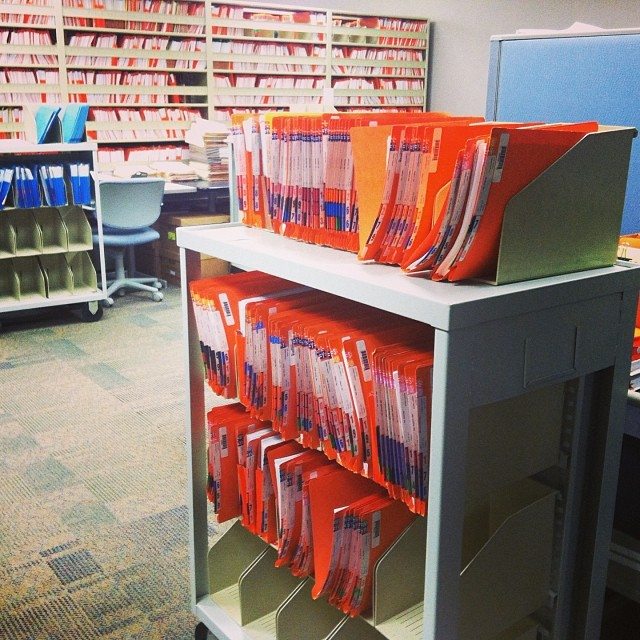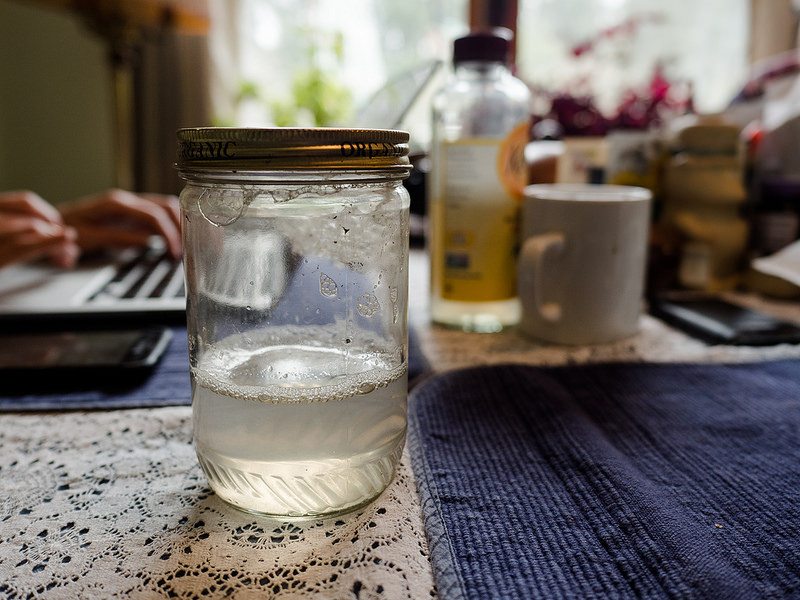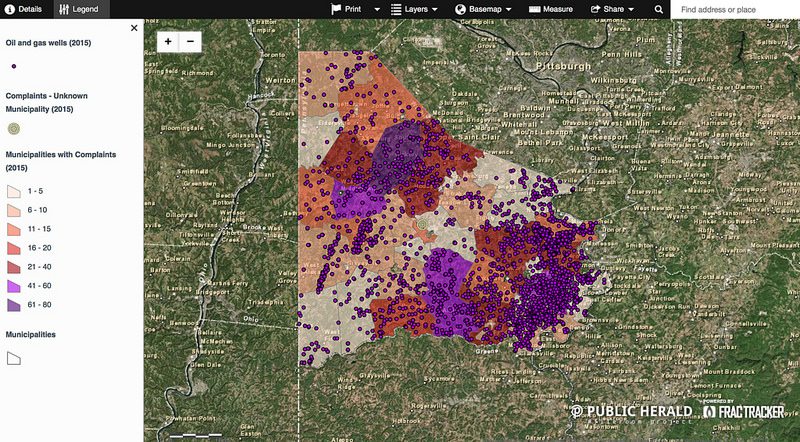Submitted by Melissa Troutman, Executive Director, Public Herald
In September 2015, Public Herald published a groundbreaking report about the release of thousands of citizen complaints related to water contamination from unconventional oil and gas mining – or ‘fracking’ – in Pennsylvania, and a massive cover-up on the scale and scope of drinking water pollution across the state.
Water collected and jarred by a complainant after a JKLM drilling operation illegally injected chemicals (surfactants and Rock Drill Oil containing BTEX compounds) underground impacting water supplies in Potter County, PA. The alarm for the incident was raised by complaints to Pennsylvania DEP. Read the initial report from Public Herald. © Joshua B. Pribanic
Public Herald’s complaint report would go on to identify nine ways that state regulators covered up water contamination from fracking. These cover-ups are still happening on a regular basis, despite Governor Tom Wolf’s promise when he took office to make oil and gas fracking “safe” for Pennsylvanians. Even after articles were published about the ignored complaints, most recently by a follow-up report from Laurel Peltier at the Baltmore Fishbowl, Governor Wolf has yet to take action or respond to these families.
Worst yet, it’s not just Pennsylvania leadership that’s ignoring thousands of complaint cases of water contamination. The U.S. Environmental Protection Agency (EPA) has sabotaged the public trust and violated the public interest by also ignoring stacks of documented evidence that fracking poses a major risk to drinking water supplies. It’s worth noting, this is the same type of evidence that lead to the recent Flint water crisis investigation in Michigan, and the same type of evidence that initiated the EPA fracking study in the first place, i.e. citizen complaints.
By ignoring the complaint data and abandoning its own science, the EPA falsely concluded in June 2015 that fracking does not cause “widespread, systemic” water contamination. In November 2015, the EPA’s own Science Advisory Board (SAB) called EPA’s conclusion into question; something Public Herald also questioned in our September 2015 complaint report.
Despite the importance that complaint records hold in answering the question about total water contamination, recent studies released by both EPA or USGS failed to include an aggregate of complaint data in their conclusions about fracking and groundwater contamination.
The complaint evidence has been released by Public Herald’s File Team at PublicFiles.org, where 2,309 citizen complaint investigations for 17 of 40 shale counties is online for the first and only time in history.
The data now gives the public, scientists and journalists direct access to evidence initially shrouded by the state under exemptions in the right-to-know law. The data also includes maps that show clusters of where some of the most vulnerable communities in Pennsylvania exist.

Complaint records about water contamination from fracking are contained in orange folders by township and county at the Pennsylvania Department of Environmental Protection (DEP). © Public Herald
Below is the Public Comment submitted by and orally presented by Public Herald Executive Director Melissa A. Troutman for a Public Teleconference of the U.S. Environmental Protection Agency Science Advisory Board Hydraulic Fracturing Research Advisory Panel on February 1, 2016.
I am Melissa Troutman, the Executive Director of Public Herald, a nonprofit investigative news organization who has investigated fracking’s impacts on water in Pennsylvania since 2011. Public Herald would like to thank the Advisory Board for providing this opportunity and commend their dedication to science in stepping forth to shed light on the disconnect between the evidence of water contamination and the unscientific conclusions made in EPA’s final fracking report.
After four years of investigations, it has become absolutely clear to Public Herald and our colleagues that there is in fact “widespread, systemic” risk to water where fracking occurs. Some of the evidence is in EPA’s own report, as noted by the Advisory Board. And yet, even the evidence documented by EPA so far is too narrow in scope and has failed to uncover the whole truth.
Public Herald has followed EPA’s research since the beginning, and our initial criticism is that by limiting the study’s scope to the “hydraulic fracturing water cycle,” the majority of water contamination cases fall outside the scope of the study, and the EPA creates a false, unscientific portrayal of fracking’s effects on water. Why does the EPA’s study not include the drilling process? Every fracked well first requires drilling, which includes the use of water. So why then is drilling not included in the EPA’s study on the effects of oil and gas fracking on water?
Our second and biggest criticism of EPA’s study is that it failed to include the most important and significant data set regarding water contamination related to fracking – citizen complaint investigations. Since 2013, Public Herald has been aggregating and analyzing citizen water contamination complaints related to fracking in Pennsylvania and their investigations by the Pennsylvania Department of Environmental Protection (DEP.) PA DEP has informed us on multiple occasions that our organization is the first entity to look at these records as a whole.
So far, EPA has used DEP’s “positive determinations” to study water contamination related to fracking in Pennsylvania. This is a grave mistake, because PA DEP does not investigate all reports of water contamination. Many cases are left “off the books” because PA DEP allows the oil and gas companies to handle water contamination on their own. But this is not the only way PA DEP (and by remaining ‘uninvolved’ also the EPA) has kept data about fracking’s impact to groundwater pollution hidden: Published in a September 2015 report, Public Herald has identified nine specific patterns used by PA DEP to “cook the books” on water contamination related to fracking in Pennsylvania. All nine ways are backed up by different contamination cases and can be read in Public Herald’s report: “COOKED: 30-month Report Finds DEP Fracking Complaints Investigations Are Cooked & Shredded”
This complaint data is also mapped by our partners at FracTracker Alliance to show the density of citizens complaints in relation to well pad locations in 17 counties across Pennsylvania. Public Herald is in the process of collecting the remaining data sets for 23 drilled counties being impacted by fracking in the Commonwealth and will be updating the data sets at http://PublicFiles.org throughout 2016.
Thanks to Public Herald research, over 2,300 complaint cases are extracted from PA DEP’s offices across the state and now available to the public online. But it never should have been us – a small nonprofit with no annual budget – who first compiled and digitized this data. We believe, as well as many of our sources, that EPA Region 3 is especially responsible for ignoring the evidence of fracking’s impacts on water in Pennsylvania and everywhere downstream.
Every data point in our investigation represents an American citizen who is potentially being impacted by harmful contamination that is the responsibility of the EPA to regulate and prevent.
It is Public Herald’s recommendation that EPA take the opportunity to study all the complaint data made available to the public so far at http://PublicFiles.org with consider the nine ways Public Herald found DEP’s determinations could be challenged. While we are critical of the EPA’s handling of its investigation thus far, we understand the tenuous position that the EPA is in and are happy to work with the agency in an open and cooperative manner in order to share the remaining complaint data as it is aggregated and digitized by our organization in an effort to protect the public interest.







Fracking is completely safe if you happen to live thousands of miles away from it. Shame on the EPA for bowing down to the fossil fuel industry and the Republican Party. What republicans don’t get is that at some point “Big government” is the same as big, ( under regulated) , business. This becomes largely theoretical until a fracking well is put in YOUR backyard and you lose everything starting with your family’s health. American citizens deserve better than to allow any industry to poison US citizens in the pursuit of profits.